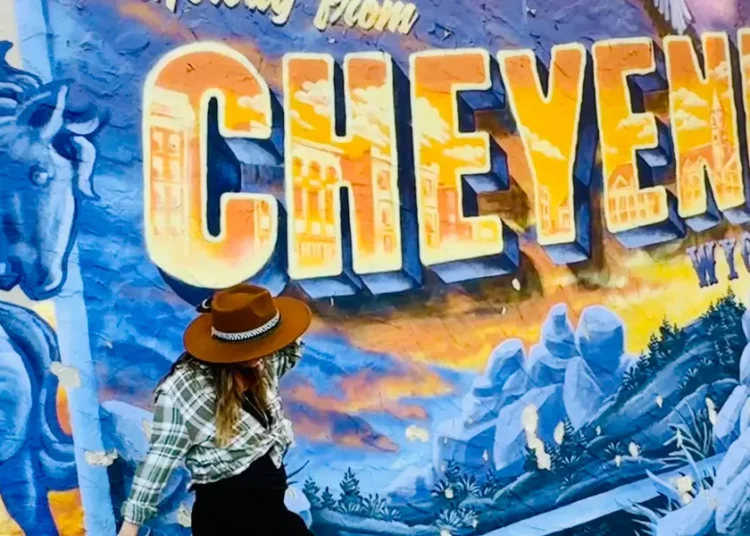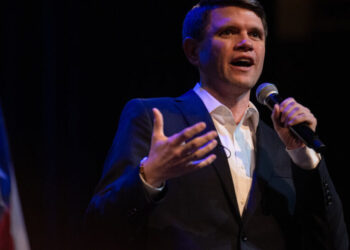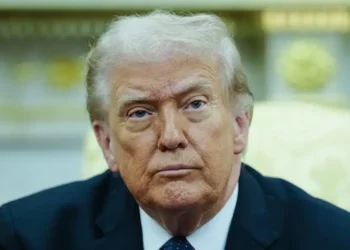COLDWATER, Kan. — Joe Ceballos has been winning elections in this tiny ranching town for more than a decade, securing his second mayoral term in a landslide earlier this month.
But Ceballos’s version of the American Dream — a Mexican immigrant who became an integral part of a close-knit Kansas community — has run smack into a newer American phenomenon: the aggressive prosecution of alleged voter fraud by noncitizens.
Ceballos, who has a green card, came to Coldwater as a teenage ranch hand. When he turned 18, a teacher at his high school took him to the county courthouse to register for the draft and to vote, friends of Ceballos and his family said, adding that it was common for teachers in town to do so at that time.
He was hired as a city employee as a young man and, eventually, ran for city council. His family hosts an annual mud-bogging competition in town, and friends say he has done electrical work on most of their homes.
But the day after he was reelected mayor, Kansas Attorney General Kris Kobach (R) said Ceballos had illegally voted in three elections, starting in 2022, charging him with voter fraud and perjury — felonies that could strip him of his elected office and land him in prison for years. It is illegal for noncitizens to vote in Kansas and in all but a small number of localities across the United States.
Ceballos has been voting regularly as a registered Republican since 2020, according to the Comanche County clerk’s office. He could be deported after more than four decades in the country if convicted. He hasn’t entered a plea.
Rooting out noncitizen voters has been a focus of Kobach’s for more than a decade. As Kansas secretary of state, an office he held until 2019, one of his signature accomplishments was a 2011 law requiring residents to provide proof of citizenship to register to vote. In 2017, President Donald Trump appointed Kobach vice chair of a national commission tasked with investigating voter fraud, an endorsement that helped carry Kobach to the Republican nomination for Kansas governor the following year.
After a federal court overturned the Kansas voter registration ID law in 2018, Trump’s commission was disbanded without supplying evidence that noncitizens had been illegally voting in large numbers. Kobach lost the gubernatorial race to Democrat Laura Kelly.
Despite those setbacks, Trump has continued to make broad claims about the prevalence of election fraud. Kobach, who began his term as Kansas attorney general in 2023, continues to champion the issue.
“Noncitizen voting is a real problem,” Kobach said during a news conference announcing the charges against Ceballos, which carry maximum penalties of more than five years in jail. “It is not something that happens once in a decade. It is something that happens fairly frequently.”
The charges have thrown the town of Coldwater, two hours southwest of Wichita, into chaos. With fewer than 1,000 residents, Coldwater struggles to sustain a bar or a coffee shop, and a dwindling city budget makes it difficult to fix roads or maintain the 100-year-old sewer line. Residents say they appreciated that Ceballos stepped up to address these issues.
Non-U.S. citizens shouldn’t be voting, residents said, but those interviewed by The Washington Post said they hope prosecutors will decide that Ceballos simply made a mistake and that the charges will be dropped. Some knew he was born in Mexico but assumed he had gained citizenship long ago, they said. Others said the topic never came up. A few said Kobach appears to be using their town to score political points with little regard for the desires of the people who live there.
“I’m all for closing our borders, I’m all for legal immigration. I’m a Republican at heart, I love President Trump,” said Terry Abel, a family friend who has known Ceballos for years. But Ceballos “100 percent” loves his community and his country and was trying to help, he said.
Standing outside city hall, Abel’s son Gabe, 15, said he has been disturbed by hateful comments he has seen online as news spread that a Mexican immigrant had not only been voting but held public office in Coldwater. “They’re like, ‘Deport him,’ and all that stuff. It’s just awful,” said Gabe, who is close friends with one of Ceballos’s grandsons. “If you really know him, and you know the situation, you would know he definitely didn’t mean to do a bunch of crimes. He’s a really good dude.”
Dave Gerstner, who said he played pool with Ceballos for years, said his friend shouldn’t have been voting if he isn’t a citizen. But sending him to prison isn’t “fair or just” if he didn’t realize he was committing a crime, Gerstner said.
Kobach is prosecuting Ceballos “for optics … rather than, you know, go get some bad guys who are illegals,” he said
Ceballos, 54, declined through a family member to be interviewed. His attorney, Jess Hoeme, said Ceballos didn’t realize he wasn’t allowed to vote and will fight the charges. “He thought he was an American. He’s always been an American. The technicality of citizenship perhaps has escaped him,” Hoeme said.
Ceballos was granted a green card in 1990, when he was about 20 years old, but didn’t apply for citizenship until this February, according to the Department of Homeland Security.
His first court appearance is scheduled for Dec. 3, but in the meantime, Hoeme said Ceballos is “stepping away” from his official mayoral duties “for the sake of the people of Coldwater.”
“He doesn’t want to cause problems,” he said. “His objective has always been to help and do the right thing for the city of Coldwater and Comanche County. And right now he is reeling from … what exactly is his purpose?”
Chickie Brass said she met Ceballos when he was 12 and working at her family’s ranch in Texas, herding cattle and maintaining fences. In 1986, when he was 16, he and his brother moved to Coldwater when her family started a new ranch there, she said. She remembers taking Ceballos to Wichita to deal with immigration paperwork before he moved off the ranch to live with friends in town, Brass said.
He earned a certificate in welding in 1992, community college records show, and worked on the city’s labor crew for two years before being put in charge of the water department, according to local news reports. Now he runs a tree service business and works as an electrical lineman in addition to his mayoral duties, his friends said.
When he first ran for city council in 2011, Ceballos told local newspaper the Western Star that he planned to focus on cleaning up the city’s lake and repairing its back alleys. Asked why he was running, Ceballos said, “because I want to be a part of the city.”
“I want to work for the tax-paying people, because I’m here, and my family is here and this is my home,” he said.
Ceballos won that election and has held public office ever since, becoming mayor in 2021. Dealing with permits, fines and budgets in a town like Coldwater where everyone knows each other can be a thankless job, residents said. In one year, Ceballos was the only candidate on the ballot for three open city council seats.
“People run for office in a town like Coldwater out of concern for the community,” said TruDee Little, who worked alongside Ceballos when she was the Coldwater city clerk, describing the mayor as honest and sincere.
It is unclear how Ceballos caught the attention of Kobach. The attorney general’s office declined to comment.
At the Nov. 5 news conference announcing the charges, Kobach said the voter identification law that he had championed more than a decade ago would have prevented this situation. “That is a benefit of that law. It prevents people who aren’t sure whether they are entitled to vote or not from getting on the voter rolls,” he said.
The voting system is based on trust, he said. “We allege that Mr. Ceballos violated that trust.”
Over the last decade, election law experts who have examined claims of widespread voter fraud say they have found little evidence of it, including investigations this year into noncitizen voting in Louisiana, Tennessee and Oregon.
The charges against Ceballos could give the false impression that noncitizens voting is common, said Barry Burden, a political scientist at the University of Wisconsin at Madison and director of its Elections Research Center. “There are some cases where noncitizens become registered to vote, but it’s a tiny sliver of the registration rolls, usually done by accident or administrative error or misunderstanding — sometimes on the part of the voter, but also on the part of election officials,” Burden said.
Allen Davis, sitting at the Snappy Stop gas station in Coldwater with friends recently, said allowing noncitizens to vote would be “a devastation to this country,” but Ceballos probably just made a mistake. “He wasn’t here with a hand out,” Davis said. “A lot of them that come today come here for the benefits they can get, for the goodies and the handouts. He wasn’t that man.”
But he isn’t happy with the incursion of national politics into the affairs of his small town. He previously voted for Kobach but probably won’t again, he said. “I think somebody is probably trying to make a name for themselves as a politician,” Davis said.
Patrick Marley in Wisconsin contributed to this report.
The post Mayor of tiny Kansas town could be deported over voter fraud charges
appeared first on Washington Post.




